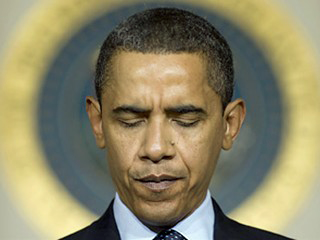If history holds, President Obama’s second term will be marked by fewer legislative achievements, more gridlock, and more contentious ideological division than his first. It is hard to see how this is possible. But I suspect we’ll soon find that it is inevitable. It’s because of the divide between the leader he promised us he would be, and the politician he actually is.
The ongoing debate over understanding Obama as a politician has moved into odd territory over the past few years – the extremes between being cast as a lightbringer, healer of the planet, solver of all our racial woes, and on the other as a devious socialist bent on national ruin. All this attention gives the man, from my perspective, too much credit for being interesting. He is not all that complicated. The key to understanding Obama from my perspective is the traditional lens of urban Democratic machine politics – an approach bent on bending your foes into caricatures of themselves and organizing your own community into a political blunt instrument to wield at whim.
The president is miscast as a wonky technocrat, which he has never been, or a leftist true believer, which is more about the dabbling of his formative years than the man he became. His priority is not policy, nor is he interested in the wholesale remaking of American life into a progressive utopia. Obama does believe the mechanisms of government are better, and produce more ethical outcomes, than the competition of the marketplace – but so do many politicians. But even if he didn’t believe that, Obama would pursue the kinds stakeholder-focused policies he does, because that is how you wield power in the traditional machine politics environment.
Applied nationally, this approach doesn’t heal the land or the hearts of people tired of partisan dischord – it doubles down on the divides of class and interest, an approach even the left acknowledges has made for a nation more divided. The contraception mandate is a perfect representation of this strategy: a calculated and unexpected declaration that religious liberty extends only so far as the whims of a bureaucrat will allow while benefitting politically from creating a wedge within the opposing coalition and ostracizing those Catholics in their funny hats. These flashpoints are perfect examples of traditional big city politics: you sideswipe your foes with an argument they don’t even expect using the full weight of power, and reap the benefits. This harsh approach has its limits, however – it poisons the well for negotiation and agreement on things that matter – as Obama has discovered on more than one occasion.
When this power from on high approach runs into barriers, it sparks skepticism – not of the machine politics strategy, but of democracy itself, as Peter Orszag has argued. Orszag, Tom Friedman (“if we could just be China for a day, the experts could impose by diktat what they cannot win through democratic debate”), and others who’ve expressed skepticism in a functioning democracy are really expressing the frustration of those confident in their own abilities to re-order society, to fix things and people, and for the utopian dream of humanity to finally be fulfilled under their august rule. The Road to Serfdomtaught us that planners hate to force agreement, but if they feel they must, they will, using any means necessary, and with no compunction. Steve Hayward described Jimmy Carter as a man who ran for office promising “a government as good as the people” and ended his term by saying the people were no good. If the bill fails, perhaps it is because you did not love Obama enough.
This is the heart of Obama’s underlying critique of those people who disagree with him, which crops up now and again, most recently of Israel: they simply don’t know what’s good for them, and he does. As Joel Kotkin writes: “More disturbing still may be the clerisy’s regal disregard for democratic give and take. Both traditional hierarchies… disdain popular will as intrinsically lacking in scientific judgment and societal wisdom… Such experts, of course, see little need for give and take with their intellectual inferiors, in Congress or elsewhere. This attitude is expressed in the administration’s increasing use of executive orders to promote policy goals such as better gun control, reduced greenhouse emissions or reform of immigration. Whatever one’s views on these issues, that they are increasingly settled outside Congress represents a troublesome notion.”
Obama accepted the presidency four years ago as someone for whom the hopes of the nation were wrapped up in healing the wounds of the Bush era. Today he accepts it as a self-branded visionary who has revealed himself at heart to be a pedestrian partisan who wants to use the love and affection of his loyal supporters to crush his opponents and their constituencies. This is the essential broken promise of Obama’s presidency and his entire political career. He is not a technocratic wonk or a healer of planets or public squares. The healing he seeks is false talk of goodwill and charity after his opponents have been thoroughly defeated, just as the policy he seeks is the consolidation and cultivation of power. He has four more years to engage in his brand of political rule now – and at the end of it, I suspect we will look back on eight long years full of strife, when little was achieved for a nation where e pluribus unum no longer applies.
[First published at RealClearPolitics.]





